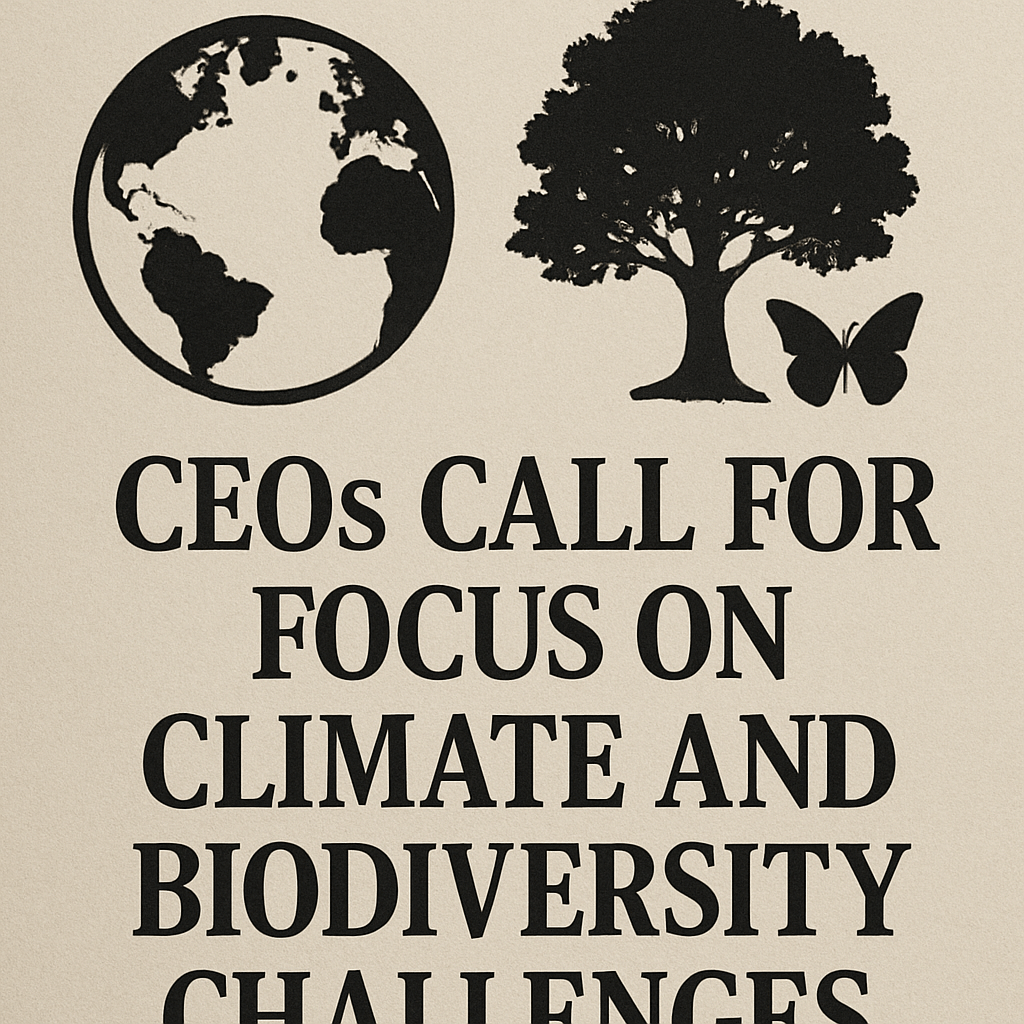CEOs Call for Focus on Climate and Biodiversity Challenges

Despite the increasing urgency of climate change and biodiversity loss, the collective ability of societies to respond effectively seems to be diminishing. A combination of geopolitical divides, trade wars, significant shifts in U.S. policies, and concerns about the financial implications of potential solutions have collectively impeded momentum towards sustainability.
Understanding the Geopolitical Landscape
As highlighted by members of the Council on Sustainability Transformation established by Environmental Resources Management (ERM), it is essential to reevaluate how both private and public sectors approach sustainability. These entities must ensure that their strategies not only promote ongoing advancements in sustainability but also sustain competitive advantages in an increasingly complex global environment.
Short-term economic incentives can entice companies and nations to compromise on sustainability measures. However, it is crucial to understand that while some may gain immediate economic benefits by scaling back on sustainability, such strategies could lead to substantial long-term risks. The question remains: Are current sustainability frameworks overly complicated and potentially obstructive in addressing pressing environmental issues?
New Questions for a Complex Arena
To navigate this landscape effectively, businesses and governments must ask critical questions:
- Is the expansive sustainability agenda created in recent decades a help or hinderance?
- What radical prioritization of issues is necessary to ensure effective environmental responses?
- When facing concurrent geopolitical, economic, societal, and sustainability challenges, how can appropriate trade-offs be identified?
- What primary barriers prevent the formation of robust collaborations that enhance sustainability with minimal trade-offs?
Prioritizing Existential Threats
Given the pressing global threats posed by climate change and biodiversity loss, it is imperative to reallocate corporate focus towards these critical areas. Much like a fire demands immediate attention, immediate corporate and governmental action is necessary to confront the dual crises of climate change and ecological degradation. While societal issues such as human rights and employee safety remain relevant, the fundamental risks posed by climate change and biodiversity loss necessitate urgent collective action across all sectors.
Addressing climate change head-on doesn’t overlook social factors; rather, it underscores their interconnectedness. Failure to mitigate environmental issues will exacerbate health disparities and economic vulnerabilities, particularly for marginalized communities. In this context, prioritizing climate initiatives not only supports ecological resilience but also paves the way for more equitable social outcomes.
Unlocking the Value of Sustainability
A narrow focus can significantly enhance the potential benefits associated with sustainability efforts, from cost savings and revenue-generating innovations to the creation of new markets. Companies undermined by an over-diversified sustainability agenda may overlook highly impactful opportunities that arise directly from addressing climate change and biodiversity loss. As such, a focused commitment on these priorities is essential for long-term business viability.
Identifying Overlaps for Strategic Advantage
Sustainability efforts often compete with other imperatives within both the private and public sectors. Notably, Europe has established the most rigorous sustainability standards, but this has raised concerns regarding its competitive position on the global stage. Recent sentiments have emerged advocating for a simplification of existing sustainability policies, such as the Corporate Sustainability Reporting Directive (CSRD), to ease the burden on businesses.
However, merely balancing various priorities is insufficient; proactive strategies that minimize trade-offs must be implemented. For example, investments in renewable energy and efficiency solutions could enhance energy independence, a lesson underscored by Europe’s experience with Russian gas dependency amid geopolitical tensions. Moreover, a concerted shift towards low-carbon technologies such as solar, electric vehicles, and smart grids could foster new employment opportunities, stimulate economic growth, and fortify supply chains against external disruptions.
Encouraging Collaborative Efforts
In light of the complex sustainability challenges faced by industries globally, consolidated efforts among businesses, governments, and investors are imperative. They can leverage collaborative platforms for innovative, solutions-oriented partnerships that align more closely with the aspirations of the Paris Agreement and the Kunming-Montreal Global Biodiversity Framework.
- Align policies and practices to foster cooperative efforts among stakeholders.
- Adopt measures to lower barriers to equitable trade and open markets to foster collaboration.
Furthermore, companies must resist the temptation of retreating toward short-term solutions, particularly in response to shifting U.S. trade policies. They need to unify their approaches to leverage sustainability for long-term resilience while facing regulatory challenges, such as antitrust laws that may inadvertently stifle constructive collaborations. Policymakers should thus offer more flexibility to industries for cooperation in crucial areas to expedite sustainable practices.
Conclusion: A Call for Prioritization and Action
While the momentum for sustainability may be faltering, continual progress is both possible and essential. This requires laser-focus investments and responses centered on both climate change and biodiversity, along with addressing pressing social issues. Companies should strive to identify where sustainability intersects with other priorities and pursue strategies that bolster resilience and competitiveness. Only through radical prioritization can we truly advance towards a sustainable future for business, society, and the planet.
Mark Cutifani is the former CEO of Anglo American. Johannes Teyssen is the former CEO of E.ON.
The opinions expressed here reflect the authors’ views and do not necessarily represent those of any affiliated organizations.
Additional Expert Insights
Recent analyses emphasize that sustainability measures must evolve to remain relevant and embedded within organizational frameworks. Experts suggest integrating sustainability metrics into core business performance indicators can facilitate better alignment with corporate goals. By embedding these principles within the overall business strategy, companies will not only mitigate risks but also seize opportunities for growth as global attitudes shift towards sustainability.
Furthermore, developments in technology and innovation play a pivotal role in shaping future sustainability strategies. The advent of blockchain in supply chain management, for instance, enhances transparency and traceability in sustainability efforts. Companies leveraging such technologies can significantly reduce wastage and improve overall efficiencies, aligning economic gains with environmental obligations.
Continued dialogue among stakeholders is essential to clarify expectations on sustainability standards, ensuring they evolve in harmony with technological advancements and global challenges. In this collaborative environment, mutual benefits can arise, reinforcing both economic performance and the collective responsibility to address climate change and biodiversity loss.
Source: fortune